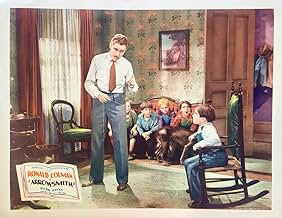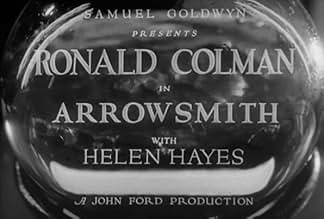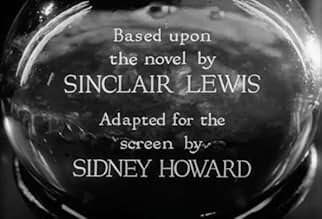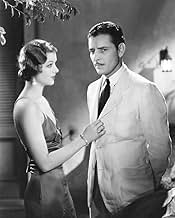VALUTAZIONE IMDb
6,2/10
2147
LA TUA VALUTAZIONE
Aggiungi una trama nella tua linguaA medical researcher is sent to a plague outbreak, where he has to decide priorities for the use of a vaccine.A medical researcher is sent to a plague outbreak, where he has to decide priorities for the use of a vaccine.A medical researcher is sent to a plague outbreak, where he has to decide priorities for the use of a vaccine.
- Candidato a 4 Oscar
- 4 vittorie e 4 candidature totali
Alec B. Francis
- Twyford
- (as Alec Francis)
Erville Alderson
- Pioneer
- (non citato nei titoli originali)
Beulah Bondi
- Mrs. Tozer
- (non citato nei titoli originali)
Florence Britton
- Miss Twyford
- (non citato nei titoli originali)
Josephine Brown
- West Indies Village Bride
- (non citato nei titoli originali)
Nora Cecil
- Nurse
- (non citato nei titoli originali)
Recensioni in evidenza
Arrowsmith (1931)
*** (out of 4)
John Ford's adaptation of Sinclair Lewis' novel about a young doctor (Ronald Coleman) who constantly fears that he's not as good as everyone says. The doctor keeps struggling with his duties to his profession as well as his duties to his wife (Helen Hayes). I wasn't expecting too much out of this film but was pleasantly surprised how much I enjoyed it even with all of its flaws. Ford's direction is fairly weak as he never really brings any flair to the material but this is made up with some terrific performances. Coleman steals the film and really delivers all the goods as he's able to show the frustrations of a doctor trying to do the right thing for everyone. Hayes is also very good in her supporting role as is the supporting cast, which includes Richard Bennett, A.E. Anson and Myrna Loy.
*** (out of 4)
John Ford's adaptation of Sinclair Lewis' novel about a young doctor (Ronald Coleman) who constantly fears that he's not as good as everyone says. The doctor keeps struggling with his duties to his profession as well as his duties to his wife (Helen Hayes). I wasn't expecting too much out of this film but was pleasantly surprised how much I enjoyed it even with all of its flaws. Ford's direction is fairly weak as he never really brings any flair to the material but this is made up with some terrific performances. Coleman steals the film and really delivers all the goods as he's able to show the frustrations of a doctor trying to do the right thing for everyone. Hayes is also very good in her supporting role as is the supporting cast, which includes Richard Bennett, A.E. Anson and Myrna Loy.
Ronald Colman,(Dr. Martin Arrowsmith),"A Tale of Two Cities" '35, is a young doctor who starts out in life and desires to progress into the laboratory and look under a microscope all day long. However, he no long completes medical school and meets up with Helen Hayes,(Leora Arrowsmith) and on the first date, asks her to marry him. Martin and Leora are madly in love with each other but it is difficult for Martin to establish himself as a doctor, so they move to South Dakota. Myrna Loy,(Joyce Lanyon),"The Mask of Fu Manchu",'32 plays a sexy gal who has eyes for Martin and could lead to some problems. In 1931 this was a big hit film because of Helen Hayes, a great theatrical actress and Ronald Colman the thrill of most ladies during this period of time. Myrna Loy was young and pretty and getting great attention from Hollywood and the general audiences. There was plenty of smoking through out this film and it clearly shows how the world has finally changed about its view on smoking.
Sinclair Lewis wrote ARROWSMITH in 1923, after the first two of his blockbuster novels that dissected American Society (MAIN STREET and BABBITT). Lewis decided to make a complete study about the medical profession. As such it was brilliant - far more brilliant than this movie is. If one can think of the novel as what it is - an expose about what is wrong concerning the medical profession - the novel is a glass of fine champagne, and this movie version is a glass of lemonade! Lewis takes us along the entire career of Martin Arrowsmith - through medical school, through practice in a small town, through his marriage to Leora Tozer, through his going to the big city (New York) where he is connected to a large, well-known Foundation, to his battling the plague (and losing his wife and his co-worker), and his finally coming to terms with what he wants from his profession. For the key to the novel is that medicine is extremely lucrative, but Martin is very idealistic. He does not seek riches, but wants to help his fellow man.
The problem, as the film proceeds, is that the people who run or control the profession (or society, for that matter) can care less for the idealistic goal. For one reason or another they want results that are pragmatic or banal. For example, one would think that the Foundation (a swipe at the Rockefeller Foundation, by the way) would be really gung ho about an idealistic medical researcher. They certainly have the laboratories and talent for real progress. But they also have a strong desire for immediate results that can be used for propaganda purposes. So they keep pushing aside certain desires for private testing that Arrowsmith and his mentor Max Gottlieb (A.E. Anson) are requesting on the bubonic plague serum. The director of the foundation insists that Arrowsmith goes to a plague saturated island with his co-discoverer, for immediate SUCCESSFUL results. This leads to massive tragedy in the novel and the film.
This doesn't come across too clearly in the film. Instead it looks like Martin (Colman) would like more time to test, but the emergency prevents it. This weakens the novel's criticism. And this is not the only example.
When Martin starts out in the small town, the local medical community has this idiot running it who knows squat about modern medicine, but is great at self-advertising. The man, who looks like Theodore Roosevelt, thinks that the height of local medical activity is running a "health day" parade. This too is not in the movie.
The film, in short, short-changes Lewis's wonderful novel. In fact, more of the spirit of Lewis's attack can be found in the Robert Donat - Rosalind Russell - Ralph Richardson film THE CITADEL (based on an A. J. Cronin expose novel). That's rough, considering how important the critique by Lewis really was.
The film's cast gives it their all, particularly Helen Hayes (still the young actress who won her first Oscar that same year for THE SIN OF MADELON CLAUDETTE), Myrna Loy (in a heavily cut role) and Colman. John Ford's directing was somewhat mediocre in this film, unlike later works of his. So I give it a "6" out of "10".
The problem, as the film proceeds, is that the people who run or control the profession (or society, for that matter) can care less for the idealistic goal. For one reason or another they want results that are pragmatic or banal. For example, one would think that the Foundation (a swipe at the Rockefeller Foundation, by the way) would be really gung ho about an idealistic medical researcher. They certainly have the laboratories and talent for real progress. But they also have a strong desire for immediate results that can be used for propaganda purposes. So they keep pushing aside certain desires for private testing that Arrowsmith and his mentor Max Gottlieb (A.E. Anson) are requesting on the bubonic plague serum. The director of the foundation insists that Arrowsmith goes to a plague saturated island with his co-discoverer, for immediate SUCCESSFUL results. This leads to massive tragedy in the novel and the film.
This doesn't come across too clearly in the film. Instead it looks like Martin (Colman) would like more time to test, but the emergency prevents it. This weakens the novel's criticism. And this is not the only example.
When Martin starts out in the small town, the local medical community has this idiot running it who knows squat about modern medicine, but is great at self-advertising. The man, who looks like Theodore Roosevelt, thinks that the height of local medical activity is running a "health day" parade. This too is not in the movie.
The film, in short, short-changes Lewis's wonderful novel. In fact, more of the spirit of Lewis's attack can be found in the Robert Donat - Rosalind Russell - Ralph Richardson film THE CITADEL (based on an A. J. Cronin expose novel). That's rough, considering how important the critique by Lewis really was.
The film's cast gives it their all, particularly Helen Hayes (still the young actress who won her first Oscar that same year for THE SIN OF MADELON CLAUDETTE), Myrna Loy (in a heavily cut role) and Colman. John Ford's directing was somewhat mediocre in this film, unlike later works of his. So I give it a "6" out of "10".
Although the film has not aged well, "Arrowsmith" was well regarded when it was released and garnered four Academy Award nominations including Best Picture. Perhaps in those early days of sound, competent use of the camera and decent recording equipment were regarded as high values that merited praise. However, with the exception of some occasionally striking cinematography by Ray June, this John Ford adaptation of the Sinclair Lewis novel is choppy, unevenly acted, and betrays its age.
Later in the 1930's, Sidney Howard adapted the sprawling historical novel "Gone with the Wind" into a fine screenplay that left viewers with the feeling that they had seen the entire book on screen. However, his adaptation of the Pulitzer Prize Winning "Arrowsmith" omits the core message of the novel and rushes through events in the life of Dr. Martin Arrowsmith in brief vignettes that leave viewers confused. Characters appear and disappear, decisions and moves are made without deliberation or motivation, and Arrowsmith himself comes off as a shallow individual with little regard for either those he supposedly loves or those he supposedly has dedicated his life to saving.
Ronald Colman is generally a fine actor, and his idealism in "Lost Horizon" appeared genuine. However, Colman's suggested idealistic behavior in "Arrowsmith" is not convincing, despite a few effective scenes towards the end of the film. Helen Hayes has a few good scenes as the doctor's wife, although Myrna Loy has little to do but look seductive, which she does quite well.
Unfortunately, the scenes in the Caribbean seem demeaning to the characters, and a local doctor's willingness to allow what is effectively experimentation on his fellow countrymen borders on the criminal. However, these attitudes were considered the norm when the film was made and should be viewed in the context of the period. Although most films seem far too long, "Arrowsmith" is much too short to convey the canvas that Lewis painted in his novel. Almost like a Clift Notes version of the book, John Ford's "Arrowsmith" disappoints, especially when the talent expended on its production is considered.
Later in the 1930's, Sidney Howard adapted the sprawling historical novel "Gone with the Wind" into a fine screenplay that left viewers with the feeling that they had seen the entire book on screen. However, his adaptation of the Pulitzer Prize Winning "Arrowsmith" omits the core message of the novel and rushes through events in the life of Dr. Martin Arrowsmith in brief vignettes that leave viewers confused. Characters appear and disappear, decisions and moves are made without deliberation or motivation, and Arrowsmith himself comes off as a shallow individual with little regard for either those he supposedly loves or those he supposedly has dedicated his life to saving.
Ronald Colman is generally a fine actor, and his idealism in "Lost Horizon" appeared genuine. However, Colman's suggested idealistic behavior in "Arrowsmith" is not convincing, despite a few effective scenes towards the end of the film. Helen Hayes has a few good scenes as the doctor's wife, although Myrna Loy has little to do but look seductive, which she does quite well.
Unfortunately, the scenes in the Caribbean seem demeaning to the characters, and a local doctor's willingness to allow what is effectively experimentation on his fellow countrymen borders on the criminal. However, these attitudes were considered the norm when the film was made and should be viewed in the context of the period. Although most films seem far too long, "Arrowsmith" is much too short to convey the canvas that Lewis painted in his novel. Almost like a Clift Notes version of the book, John Ford's "Arrowsmith" disappoints, especially when the talent expended on its production is considered.
Goldwyn put together a lot of fine talent here, but none of it jells.
Ronald Colman, Laurence Olivier's idol and one of the screen's most likable actors, is just plain miscast. Helen Hayes projects annoyingly to the audience, stage fashion, rather than letting the camera discover her emotions, as even the young Myrna Loy knows how to do. Richard Bennett is enjoyably over-the-top as Sondelius but A. E. Anson's accent is a deal-breaker as Gottlieb (as if there weren't enough real Middle European actors in Hollywood at the time).
Sydney Howard's script is condensed to the point of silliness - the other reviewers here who contrast "Gone With the Wind" as a model of condensation are praising an uncredited Ben Hecht, not Sydney Howard. Ray June's fluid cinematography is beautiful throughout, with more than one shot that would wind up re-used in Ford's "The Searchers" many years later.
The story is that Goldwyn hired a bibulous Ford on condition that the director couldn't take one drink during production. Helen Hayes noticed that as the shoot progressed, Ford started discarding pages and then whole scenes, in a race to finish the film and get back to his booze. That may be one more reason that the film is barely coherent.
Hey, nobody's perfect all the time.
Ronald Colman, Laurence Olivier's idol and one of the screen's most likable actors, is just plain miscast. Helen Hayes projects annoyingly to the audience, stage fashion, rather than letting the camera discover her emotions, as even the young Myrna Loy knows how to do. Richard Bennett is enjoyably over-the-top as Sondelius but A. E. Anson's accent is a deal-breaker as Gottlieb (as if there weren't enough real Middle European actors in Hollywood at the time).
Sydney Howard's script is condensed to the point of silliness - the other reviewers here who contrast "Gone With the Wind" as a model of condensation are praising an uncredited Ben Hecht, not Sydney Howard. Ray June's fluid cinematography is beautiful throughout, with more than one shot that would wind up re-used in Ford's "The Searchers" many years later.
The story is that Goldwyn hired a bibulous Ford on condition that the director couldn't take one drink during production. Helen Hayes noticed that as the shoot progressed, Ford started discarding pages and then whole scenes, in a race to finish the film and get back to his booze. That may be one more reason that the film is barely coherent.
Hey, nobody's perfect all the time.
Lo sapevi?
- QuizCensorship at the time meant that the subplot of Arrowsmith's liaison with another woman while still married meant that most of Myrna Loy's scenes were drastically cut. Although every attempt was made to restore the present version to its original length, there are still about 10 minutes missing.
- BlooperArrowsmith conducts a trial of his serum by giving it to half the potential plague victims and giving the other half nothing. Anyone who tried this in real life would provoke protests, if not riots. So these trials are conducted by giving half the people a placebo and not telling anyone which they are getting.
- Citazioni
Dr. Martin Arrowsmith: God give me clear eyes and freedom from haste. God give me anger against all pretense. God keep me looking for my own mistakes. God keep me at it till my results are proven. God give me strength not to trust to God.
- Curiosità sui creditiOpening credits prologue: The story of a man who dedicated his life to service and his heart to the love of one woman.
- Versioni alternativeMyrna Loy's role was substantially reduced when the film was reissued because the Production Code had taken effect. The missing scenes have been restored on the DVD.
- ConnessioniReferenced in Quarto potere (1941)
- Colonne sonoreWilliam Tell Overture
(1829) (uncredited)
Written by Gioachino Rossini
Played on piano from a recording
I più visti
Accedi per valutare e creare un elenco di titoli salvati per ottenere consigli personalizzati
- How long is Arrowsmith?Powered by Alexa
Dettagli
- Tempo di esecuzione
- 1h 48min(108 min)
- Colore
- Proporzioni
- 1.20 : 1
Contribuisci a questa pagina
Suggerisci una modifica o aggiungi i contenuti mancanti




































